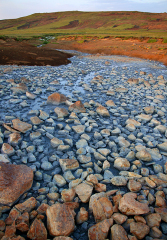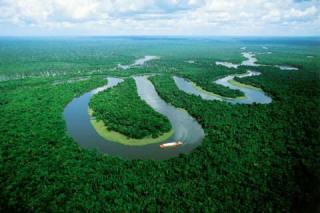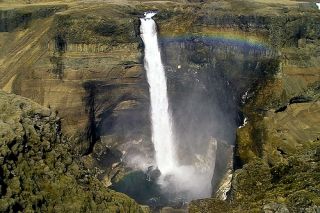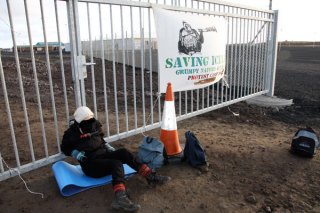Articles
May 22 2010
1 Comment
Alterra Power/Magma Energy, Corruption, Geysir Green Energy, H.S. Orka, Privatization
This article, written by Catharine Fulton was originally published on grapevine.is
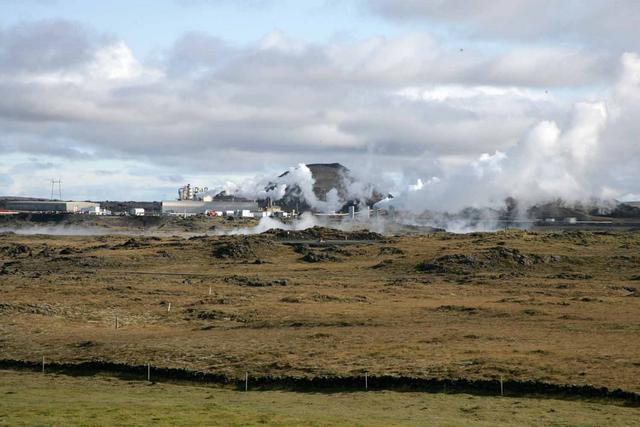 Let’s cut to the chase. The opacity of Icelandic business and politics has done the country, as a whole, no favours. Much hand shaking and back scratching has gone on behind closed doors and such secluded business environments have proved themselves to be breeding grounds for lies, corruption, fraud, swindling, and downright thievery.
Let’s cut to the chase. The opacity of Icelandic business and politics has done the country, as a whole, no favours. Much hand shaking and back scratching has gone on behind closed doors and such secluded business environments have proved themselves to be breeding grounds for lies, corruption, fraud, swindling, and downright thievery.
With Icelandic bankers being held in local prisons and wanted by Interpol and the once celebrated “outvasion Vikings” having their pants sued off by the Americans, now is a time to usher in a new, honest era of business in Iceland in an effort to get the country and its economy back on track and to restore the trust of the mass populace in the system.
Read More
Jan 28 2010
Climate Change, Dams, Ecology, Greenwash, hydropower
by Aviva Imhof & Guy R. Lanza
 Big dams have a serious record of social and environmental destruction, and there are many alternatives. So why are they still being built?
Big dams have a serious record of social and environmental destruction, and there are many alternatives. So why are they still being built?
On a hot May day, a peasant farmer named Bounsouk looks out across the vast expanse of water before him, the 450-square-kilometer reservoir behind the new Nam Theun 2 dam in Laos. At the bottom of the reservoir is the land where he once lived, grew rice, grazed buffalo, and collected forest fruits, berries, and medicinal plants and spices. Now there is just water, water everywhere.
Read More
Jan 15 2010
Arms Industry, Capitalism, Climate Change, Corruption, Dams, Greenwash, Jason Slade, Pollution, Repression
By Jason Slade
Originally published in the Nor easter
The Spectacle
Environmental issues can oftentimes be very complex. Some issues directly relate to climate change, and some do not. However, it is very important to connect the dots between issues because almost all environmental problems are caused, at their base, by capitalist expansion, commodification and privatization. Corporations have used the climate crisis and growing public concern about environmental issues to their advantage. They have learned to use the rhetoric of environmentalism to justify extremely oppressive projects whose sole purpose is to increase their power and to continue the cycle of production and consumption. Incredibly destructive projects, such as hydrofracture natural gas extraction in Upstate New York, are marketed as clean. This absurd spectacle must be stopped.
In Guy Debord’s Society of the Spectacle, he writes, “The spectacle presents itself simultaneously as all of society, as part of society, and as instrument of unification … The spectacle grasped in its totality is both the result and the project of the existing mode of production. It is not a supplement to the real world, an additional decoration. It is the heart of the unrealism of the real society. In all its specific forms, as information or propaganda, as advertisement or direct entertainment consumption, the spectacle is the present model of socially dominant life … It is the sun which never sets over the empire of modern passivity. It covers the entire surface of the world and bathes endlessly in its own glory.” And now the light of that sun is green. The green spectacle is confronting the climate crisis with hollow solutions presented to us in a pleasant, prefabricated package that can be bought if we can afford them and allow us to pollute in good conscience. In an absurd twist, these corporate false solutions cause the poor, and those who resist these schemes, to be blamed for destroying the planet. “It is not the oil companies who are to blame for climate change, but the poor who do not buy carbon offsets when they travel.” Thus, the climate crisis becomes another way to make money and increase corporate power. Read More
Nov 27 2009
Economic Collapse, Economics, Energy Prices, Heavy Industry, Kárahnjúkar, Landsvirkjun
By Indriði H. Þorláksson – Economist
The economic effects of heavy industry must take into account both short and long term economic policies.
Statements put forth without reasoning sometimes obtain more significance than they merit. Two such statements that are held aloft about the building of energy plants and heavy industry are particularly dangerous.
On the one hand that they are necessary and that they might even be the way out of the crisis and on the other that the future of the Icelandic economic system is best insured by utilizing energy resources and with heavy industry. One looks to the short term and the other to the long term but both are questionable, probably wrong and even dangerous.
The economic impact of heavy industry must take into account both short and long term economic policies, In the short term, say 3-5 years the goal is to restart the economy. In the long term the goal is to promote growth in the economic system to provide citizens with the good things in life. To do so the economy has to provide the highest augmented value to the nation for its work, capital and resources.
Read More
Nov 17 2009
4 Comments
ALCOA, Alterra Power/Magma Energy, Amazon, Arms Industry, Bakki, Century Aluminum, Climate Change, Ecology, Economics, Geothermal Energy, Greenwash, H.S. Orka, Helguvík, Jaap Krater, Landsvirkjun, Mining, Miriam Rose, Reykjavik Energy, Rio Tinto Alcan, Saving Iceland, South Africa
By Jaap Krater and Miriam Rose
In: Abrahamsky, K. (ed.) (2010) Sparking a World-wide Energy Revolution: Social Struggles in the Transition to a Post-Petrol World. AK Press, Edinburgh. p. 319-333
Iceland is developing its hydro and geothermal resources in the context of an energy master plan, mainly to provide power for expansion of the aluminium industry. This paper tests perceptions of geothermal energy as low-carbon, renewable and environmentally benign, using Icelandic geothermal industry as a case study.
The application of geothermal energy for aluminium smelting is discussed as well as environmental and human rights record of the aluminium industry in general. Despite application of renewable energy technologies, emission of greenhouse gases by aluminium production is set to increase.
Our analysis further shows that carbon emissions of geothermal installations can approximate those of gas-powered plants. In intensely exploited reservoirs, life of boreholes is limited and reservoirs need extensive recovery time after exploitation, making geothermal exploitation at these sites not renewable in the short to medium term. Pollution and landscape impacts are extensive when geothermal technology is applied on a large scale.
Krater and Rose – Development of Iceland’s Geothermal Energy – Download as PDF
The full publication will be available from Jan. 15, 2010. ISBN 9781849350051.
Oct 10 2009
1 Comment
Alterra Power/Magma Energy, Economics, Geysir Green Energy, H.S. Orka, Reykjanes, Reykjavik Energy
From The Reykjavík Grapevine, by Catharine Fulton – One by one men in suits of varying shades of grey approached the podium in the pit of the Reykjavík City Hall. One by one they pleaded their cases while Reykjavík’s esteemed mayor—the fourth in two years—Ms. Hanna Birna Kristjánsdóttir looked on appearing disinterested in what appeared to be solely a formality. As the council members continued selling the idea of selling Iceland’s resources, a crowd of 100-strong grew more agitated and increasingly vocal from their perch in the viewing gallery of the hall, separated from having a say in their own natural resources by an aesthetically pleasing glass barrier.
“People were screaming, saying that the politicians were traitors,” explained Jón Bjarki Magnússon, a student who arrived at City Hall just in time for the vote. “It was a weird feeling to see it happen, to see these people down on the floor raise their hands and the decision is made and to see all these angry people above them not able to do anything.”
The September 15th city council meeting stretched on for over three hours, during which time onlookers shouted and boo-ed as city council progressed toward approving the 32.32% sale of Iceland’s HS Orka to the Canadian-cum-Swedish firm Magma Energy Corp. Read More
Sep 20 2009
ALCOA, Amazon, Climate Change, Mining
Alcoa and Cargill have bypassed laws designed to prevent destruction of the world’s largest rain forest, Brazilian prosecutors say. The damage wrought by scores of companies is robbing the earth of its best shield against global warming.
By Michael Smith and Adriana Brasileiro
Bloomberg Markets, September 2009
For four decades, Edimar Bentes and his family have survived by farming tiny clearings in the jungle near their dirt-floor shack in the state of Para in the Brazilian Amazon. On this April afternoon, Bentes, 56, squats in the driving rain and dips a glass into what just four years ago was a crystal-clear stream that provided drinking and bathing water. He frowns as the glass fills with brown silt. A thin man with short-cropped dark hair and a tanned, deeply wrinkled forehead, Bentes gazes around his land. There are no signs of the deer, armadillos and pacas he used to hunt to feed his wife and 10 children. For Bentes and thousands of others in the Juruti region of Para whose livelihood depends on wildlife and plants, everything changed in 2006.
That’s when New York-based Alcoa Inc., the world’s second-largest primary aluminum producer, started to bulldoze a 56-kilometer (35-mile) swath of the rain forest across hundreds of families’ properties to build a railway. This cleared corridor, 100 meters (109 yards) wide, will lead to a mine that will chew up 10,500 hectares (25,900 acres) of virgin jungle over three decades. More than half of the mine will lie inside a forest that by Brazilian federal law is supposed to be preserved unharmed forever for local residents. By year’s end, Alcoa says, the railway will transport 7,000 tons a day of bauxite, the dark red ore that’s used to make aluminum, from the mine to a port on the Amazon River. Read More
Sep 16 2009
ALCOA, Bakki, Century Aluminum, Economics, Landsvirkjun, Þjórsá
By Snorri Páll Jónsson Úlfhildarson, originally published in Morgunblaðið – After last autumn’s economical collapse, the discussion about environmental issues changed rapidly. Politicians who before spoke with full force against further energy- and heavy industry projects have now completely turned around, with the premises that environmentalism is prosperity politics. The head of the Left Green party recently called the party’s environmental policy puritanical and said that it does not apply in times of economical depression. The last fortress must then be fallen – at least amongst those who believe in reforms inside the representative democracy.
Now the plan is to push through an aluminium smelter in Helguvík with all its appropriate energy construction. Svandís Svavarsdóttir, the minister of environment, recently said that there is not enough energy on the Reykjanes penisula to fulfill the smelter’s energy needs. Others have pointed out that harnessing the geothermal areas there will be such a massive attack that the areas will most likely dry up in a short time. Katrín Júlíusdóttir, the minister of industry, has stated her positive opinion about Landsvirkjun producing energy for Helguvík – and the Þjórsá river comes immadeatly up to one’s mind. She also seems to be willing to renew the memorandum of understanding between the government and Alcoa, which according to the latter’s plans means that the whole geothermal areas in north-east Iceland have to be harnessed and dams built in one or more glacial rivers. Read More
Aug 27 2009
Alterra Power/Magma Energy, Economics, Geysir Green Energy, H.S. Orka, Helguvík, IMF, Reykjavik Energy
Magma Energy, a Canadian company, wants to buy a majority share in H.S. Orka, a geothermal energy company based on the Reykjanes peninsula. In July this year Magma Energy bought a 11% share in H.S. Orka from Geysir Green Energy (GGE) and therefor became the first foreign shareholder in an Icelandic energy company. The purchase was a part of a bigger agreement between Reykjanesbær and GGE, which resulted in GGE owning a little more than 50% of H.S. Orka. Around the purchase, Ross Beaty, Magma’s director stated that the company did not plan to become predominant in H.S. Orka or meddle with the management of the company’s power plants.
In the middle of August, Orkuveita Reykjavíkur (O.R. – e. Reykjavík Energy) decided to start discussion with Magma Energy about the latter’s purchase of O.R.’s share in H.S. Orka, which is 32% and would therefor give Magma 43% share in the company and the possibility of increasing it 5%. Magma has bought the very small shares of the communities of Sandgerði and Hafnarfjörður, and has been discussing with communities like Vogar and Grindavík about buying their shares as well. If everything goes like planned, H.S. Orka, which e.g. is the biggest energy provider for the Century Aluminum’s planned smelter in Helguvík, will mostly be owned by to private companies; Magma and GGE, which will own c.a. half of the shares each. Read More
Aug 12 2009
Actions, ALCOA, Century Aluminum, Helguvík, Landsvirkjun
This morning, 20 people from Saving Iceland stopped work on the Norðuál/Century’s smelter construction site in Helguvík. People locked on to three vehicle gates in to the site and therefor stopped all traffic in and out of it. People also locked on to machinery on the site so the work was stopped for at least two hours. The construction in Helguvík has to be stopped to prevent further destruction of wilderness by the damming of glacial rivers and geothermal areas, as well as the global impacts of aluminium production.
Not so long ago, the government with Össur Skarphéðinsson (then Minister of Industry) in the front, made a special discount contract with Norðurál/Century, which was signed last Friday in the shadow of Saving Iceland’s green skyr throwing. (1) The contract includes financial support from the Icelandic state in the form of a tax discount that amounts to 16,2 million US dollars. Norðurál/Century is therefor free from paying industry fees, market fees and electricity safety fees as well as special rules will apply concerning stamp duty and planning fees, and about new taxes. (2)
Read More
 Let’s cut to the chase. The opacity of Icelandic business and politics has done the country, as a whole, no favours. Much hand shaking and back scratching has gone on behind closed doors and such secluded business environments have proved themselves to be breeding grounds for lies, corruption, fraud, swindling, and downright thievery.
Let’s cut to the chase. The opacity of Icelandic business and politics has done the country, as a whole, no favours. Much hand shaking and back scratching has gone on behind closed doors and such secluded business environments have proved themselves to be breeding grounds for lies, corruption, fraud, swindling, and downright thievery. Big dams have a serious record of social and environmental destruction, and there are many alternatives. So why are they still being built?
Big dams have a serious record of social and environmental destruction, and there are many alternatives. So why are they still being built?

